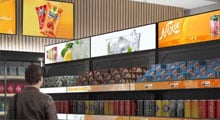The Challenge Faced
The Odlums plant located in Dublin is specific to milling purposes only and it is here where raw product is turned into various flours that will be used for Odlums own use or wholesaled as ingredients to third party end users. The plants at Cork and Portarlington deal specifically with end products that will be distributed to the retail channel.
Odlums have to-date been using Intermec products to facilitate their barcode requirements for wholesale and retail products. Upon inspection of their manufacturing plants it was recommended to retain the Intermec brand as this would allow common engineering as seen in sister plants which come under the Origin Enterprise PLC umbrella throughout Europe.
Solution Overview
Peak Technologies suggested a suite of Intermec hardware that would allow seamless integration of incoming and outgoing products to backend management systems. Within the warehouse environments the Intermec CV60 would prove invaluable as the in-cab mounting systems allowed seamless processing on-the-move without having the operator to stop, dismount and process. The CV60 computer excels in the most adverse environments with full PC functionality. The CV60 terminal, either fixed or vehicle mounted, puts wireless supply chain management right where the data is, at the dock, on the warehouse floor, in the trailer or in the yard, for the toughest material handling applications.
Across the manufacturing facilities the SR60 hand held scanners were deployed and the seamless integration of new Intermec products from old was achieved without any hindrance. Intermec’s SR60 is a tethered, handheld industrial strength laser scanner designed to meet the needs of users who require extra long range scanning. The SR60 scanner is designed to enable users to quickly and easily scan barcodes near and far, from as close as 27 inches (71 cm) to 36 feet (11 meters) away. This scanner is ideal for industrial applications including warehouse management, work in process, and in-transit visibility applications this is why Peak Technologies chose the SR60 for the Odlums requirements.
To accommodate the need to produce printed barcodes an Intermec PM4C was installed and commissioned. The multi-function PM4C printer gives the reliability, ruggedness and performance that is expected in a barcode printer from Intermec.
Return On Investment
Stock control is important area that retail technology has been applied to for decades. In the case of Woodies, like many others, this technology took the form of hand-held terminals called Piccolinks that had been in use for several years. “We used them for pretty much everything in the Woodies environment,” says Gavin Lambkin, IT director for Woodies Ireland. “They’re used for stocktaking, labelling, goods in and everything else.
“Now, Woodies isn’t a high fashion store,” Lambkin quips. “It’s a harsh environment. It’s big and dirty and dusty, and these terminals would take a lot of punishment. They get dropped and knocked about the place.”
“The Piccolinks had to be repaired a lot,” Lambkin adds, “but to be fair to the technology we’ve had them in place since 2003 so they didn’t owe us any favours!”
Despite this long-standing reliability, Lambkin explains that the company started finding it difficult to have the terminals repaired, due to the advancement of overall systems. “We had a maintenance contract in place with Peak Technologies since 2007,” Lambkin says, “and they basically told us that they could continue to support the old handhelds for another year or so, and then we’d have to start looking at an alternative solution.”
About Odlums
In the nineteenth century, three Odlum brothers were involved in separate milling operations. The mill that operated in Portlaoise was opened by William Odlum in 1845. It was this mill that formed the basis of the present business. He was succeeded by his two sons, William P. and Richard – hence the company name at that time, W.P.& R. Odlum.
By the end of the 1920s the company was operating, in conjunction with various other milling interests, a total of nine mills. In the 1960s, rising standards of living led to a fall in flour consumption and a number of milling operations went out of business. Odlums found that in order to remain competitive, it was necessary to rationalise production. Some of the smaller mills were closed. The company now operates 3 modern flour mills in Dublin, Cork and Portarlington and a specialist oatmeal mill in Sallins.
Up to 1988 Odlums was a family owned and managed company. Today it is wholly owned by Origin Enterprises PLC.
Download the PDF Version
Click the download button below to download the PDF version of this case study to save or share.






















